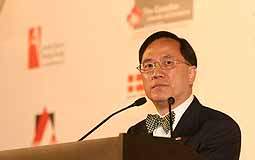
|
| Level playing field: The Chief Executive told the audience of about 1,700 business people: "Hong Kong people have a strong work ethic.They are willing to take risks if they can see there is a good chance of enjoying the fruits of their labour. They are not looking for special treatment. But they do want to be able to compete fairly." |
About 1,700 members from Hong Kong's Chambers of Commerce turned out to a post-Policy Address luncheon to hear Chief Executive Donald Tsang describe highlights from his presentation.
His maiden Policy Address raised two "sensitive" issues for the business community, the questions of a fair competition law and a minimum wage.
"I want to state quite clearly that my starting position is not to intervene in the market," he said.
The time is ripe, he suggested, to examine whether Hong Kong's current approach to fair competition serves our best long-term interests.
"We have almost 3,800 international companies using Hong Kong as their base for regional operations. Hong Kong conglomerates are getting bigger, and extending their reach even further across the globe. But we also need to consider the fact that small and medium enterprises account for 98% of the businesses in Hong Kong, and employ 60% of the private workforce.
"We need to guard against the situation where big companies, whether local or international, corner the market, which in turn can lead to price fixing or bid rigging. We don't believe that such harmful practices exist in any prominent way in Hong Kong now. But we must do our best to avoid them. We must ensure the integrity of our level playing field," he said.
"Hong Kong people have a strong work ethic.They are willing to take risks if they can see there is a good chance of enjoying the fruits of their labour. They are not looking for special treatment. But they do want to be able to compete fairly. And that's why I believe we owe it to them to look more closely at whether our current approach is right for Hong Kong and for our future economic growth."
Minimum wage vs escalating welfare bill?
Turning to the question of whether a minimum wage is right for Hong Kong, Mr Tsang stressed it would be counterproductive if it led to more jobless people. "The overwhelming majority of unemployed people would rather work than be on welfare. That is the Hong Kong way."
The main point of a minimum wage is to ensure a basic standard of living, especially for unskilled workers. The economic recovery's benefits may not be filtering down to these employees, although the recovery is lifting the cost of living - making it difficult for those earning low salaries to make ends meet.
While rock-bottom wages benefit businesses - which can use money saved to reap greater profits, invest in equipment or research and development, or hand out bigger management bonuses - they can have a negative impact on worker morale.
"Can we see a situation emerge in Hong Kong where decent men and women trying to eke out a living simply give up working? Can we see a situation where wages are so low that a more attractive option is to rely on welfare payments?
"Then, we have an entirely different situation, where welfare payments replace wages rather than provide a stopgap safety net for people in between jobs. Then, we see the welfare bill begin to escalate. Then, the Government will need to look closely at its revenue base and allocation of resources. The bottom line in that regard is whether we have to adjust our tax structure to accommodate an escalating welfare bill," Mr Tsang cautioned.
Policies 'pragmatic'
Mr Tsang stressed his determination to improve governance, foster harmony and promote widespread economic development. He noted that he had a "realistic and pragmatic agenda" for action to achieve these goals over the next 20 months of his term.
In reply to questions from the audience after his speech, the Chief Executive made it clear he was a man of action. He was asked whether plans for the harbourfront - including building Government headquarters and a Legislative Council building on Tamar and going forward with the West Kowloon Cultural District - should be put on hold until there was further study.
"These issues can be debated continuosly. The important thing is once we have debated on these issues and decided on a course of action, then we must do something about it," Mr Tsang replied.
He noted the land in West Kowloon had sat idle for more than a decade, and Tamar had been used only for car parking and location services for "quite a number" of years.
"This is the very time when development is needed. A balance must be struck somewhere, I agree with you. The whole harbour area is being looked at, and I'm sure the right decisions are being taken," he said.
Asked about the timing of a law aimed at ending racial discrimination, Mr Tsang said he expected to table it to the Legislative Council within this term.
For a full text of his speech, see On the Record.
|